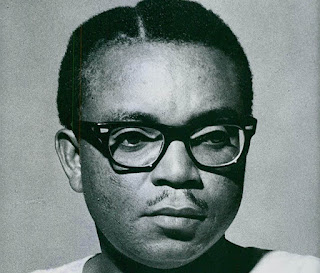RISE AND FALL OF ANTHONY ENAHORO
The man who fought that woman should be included in the decision making of the Nigerian government !!
In pre-Independence Nigeria, Enahoro’s Motion set the pace for a handful of women to be nominated to two of the three regional legislative houses. Two years later, Aiyedun was replaced by Lady Oyinkan Abayomi.
In 1959, Margaret Ekpo and Janet N. Mokelu were appointed as Special Members in the Eastern House of Chiefs. No woman was nominated to the Northern Region’s legislative institutions, Chief Anthony Enahoro, who has died aged 87, was one of the last survivors of the independence generation of Nigerian politicians. He was renowned as the parliamentarian who moved the first motion envisaging independence in 1953.
Post-independence, he was imprisoned for "treasonable felony". After his release, he had a spell as one of the ablest advocates of Nigerian unity during the civil war (1967-70). Enahoro, who became regarded as an elder statesman, was once one of the best-known Nigerians in Britain. He was the "fugitive offender" who triggered days of debate in the House of Commons in 1963 as he battled against extradition.
He was born in Uromi, in the midwest of Nigeria. He was educated in Uromi and Owo, and then – during the second world war – at the elite King's college in Lagos. It was a time of growing change and simmering nationalist politics. Although his father wanted him to be a lawyer or a civil servant, he chose journalism, in part because it went hand in hand with politics.
He attached himself in 1944 to Nigeria's pre-eminent politician-journalist, Nnamdi Azikiwe, who sent the 21-year-old Enahoro to edit the Southern Nigerian Defender in Warri. He became editor of the Daily Comet in Lagos (1945-49) and associate editor of West African Pilot 1950-52 Enahoro was prominent in politics at a time of rapid change. He was twice jailed for sedition by the colonial government, for an article mocking a former governor, and then for a speech allegedly inciting Nigerian troops serving in the British army. The British marked him as a firebrand, but even as he was jailed for a third time, he was beginning to reassess his position, After having established his own short-lived newspaper, the Daily Star, in Sapele in 1951, he moved into the orbit of the Action Group (AG), the newly formed political party of Obafemi Awolowo. Enahoro was attracted by Awolowo's rationality and coherent political programme.
He was rewarded with political advancement, becoming a member of the Federal House of Assembly. It was there, in February 1953, that he moved the historic motion for self-rule by 1956, Although it now appears a modest move, and was rejected because of the majority vote of northern members, it pressurised the British into political advance, and shook the north into accepting a faster pace towards independence. He was elected a member of the Western House of Assembly, and in 1954 became minister of home affairs in Awolowo's government, In this period Enahoro travelled frequently, especially to London in the delegation to the series of constitutional conferences, which brought Nigeria to independence in 1960. By then, with Awolowo now leader of opposition to the ruling coalition of the northern leaders and Azikiwe, Enahoro was back in the Federal House as a key player. By 1962 the AG was in crisis, with a split party, and a state of emergency in the west.
Party leaders found themselves accused of a coup plot, and, threatened with detention, Enahoro escaped via Ghana to London. Nigeria requested Enahoro's extradition under the 1881 Fugitive Offenders Act, preventing his application for political asylum. Early in 1963, the new leader of the Labour party, Harold Wilson, detected the embarrassment caused by Enahoro's arrest and imprisonment. Labour went on the attack in the Commons, with support from some Tories, backed by a media furore. "The Enahoro affair" became an issue of human rights versus the government's pusillanimous wish not to offend Nigeria, and put the Tory prime minister, Harold Macmillan, and his home secretary, Henry Brooke, in a difficult position. Enahoro was extradited, tried for treasonable felony and sentenced to 15 years' imprisonment, reduced on appeal. In his autobiography, Fugitive Offender (1965), he claimed that the trial was based on slender and doubtful evidence, and in the long run added to his political reputation.
After his release in 1966, he played an important part in the ensuing constitutional discussions. The following year, he was made commissioner for information and labour in the administration of General Yakubu Gowon.
He played a key part in the international public relations of the federal government during the civil war, calling on his quietly effective style of reasoning and his skills as a communicator. After the war, he held down wage increases in the oil boom and balanced media freedom with security needs. He lost his job in the coup of July 1975. He was later involved with the ruling party in the ill-fated Second Republic government (1979-83). He became chairman of the National Democratic Coalition that rallied the groups opposing General Sani Abacha's dictatorship in the 90s. He was chair of his own party, the Movement for National Reformation, and of the Pro-National Conference Organisation, but his real role had become one of a revered national icon.
He is survived by his wife, Helen, and five children: Kenneth, Eugene, Bella, Victor and Gabriel.
• Chief Anthony Eronsele Enahoro, politician, born 22 July 1923; died 15 December 2010.





Comments
Post a Comment